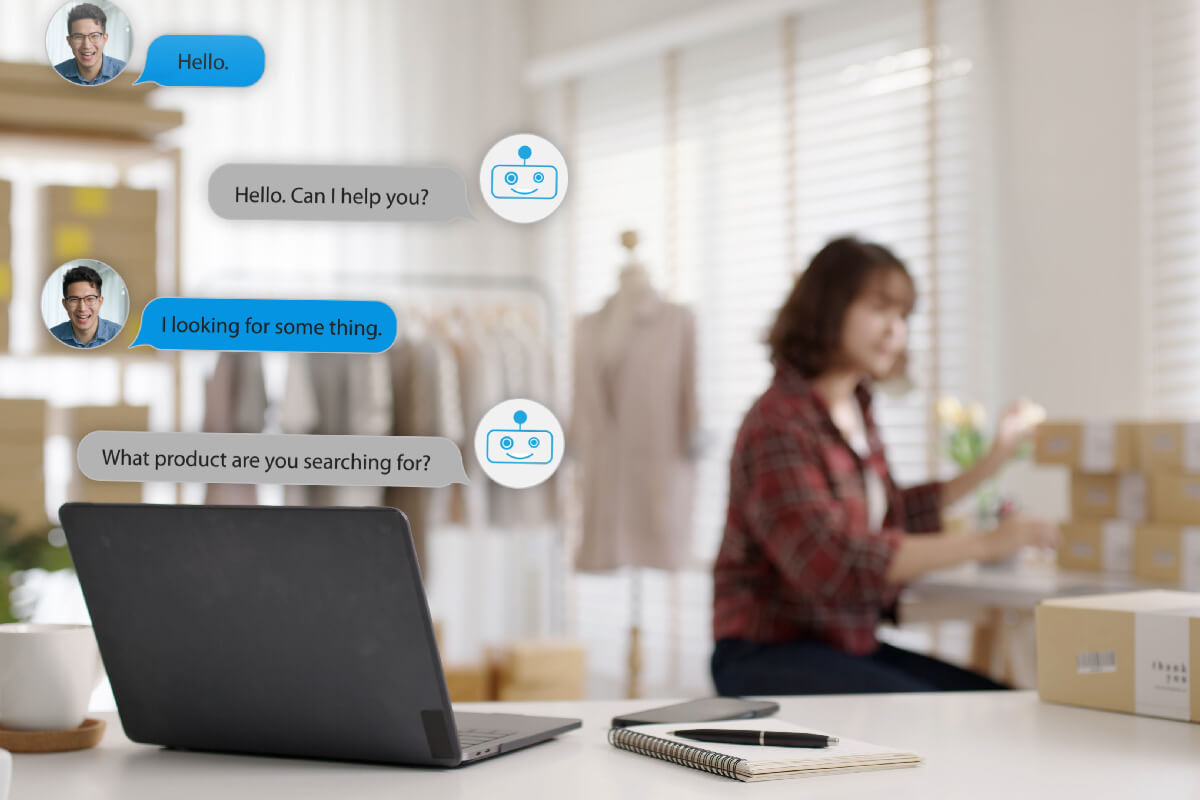Some might think it’s strange that artificial intelligence would play a role in the world of DevOps, but the reality is that AI has become a critical element in many organizations. At its core, AI helps to automate routine tasks, freeing up time and resources for other important work.
There are many ways that AI is being used in the world of DevOps, and that’s what we will explore in this article. Let’s take a deep dive into some of the key applications of AI in DevOps, including its impact on testing and monitoring, as well as its role in optimizing developer workflows.
Bug detection
If there was one thing that developers dread the most, it’s finding and fixing bugs in their code. Fortunately, AI has emerged as a powerful tool that can help to identify and fix these bugs more quickly and efficiently. AI-powered bug detection tools use machine learning algorithms to analyze code for potential issues, flagging them for developers to fix.
Bugs aren’t just a problem for developers; however – they can also impact the end-user experience. By using AI to identify and fix bugs more quickly, organizations can deliver higher-quality software to their customers, ultimately improving customer satisfaction and loyalty.
Automation and optimization
In addition to helping with bug detection, AI can also be used to automate a wide range of tasks, such as software testing, deployment, and monitoring. This helps reduce the time required to complete these tasks and allows developers to focus on higher-level and more creative work.
Another critical area where AI has a major impact in DevOps is optimizing developer workflows. For example, AI-powered chatbots can be used to help developers find the right information and resources they need quickly and easily.
Testing becomes a snap
To deliver high-quality software, it’s critical that organizations thoroughly test their apps and code. However, this can be a time-consuming and labor-intensive process. That’s where AI comes in, as it can automate testing tasks, helping speed up the testing process and minimize the risk of bugs.
Using AI to test software also allows teams to test a broader range of parameters and use cases, giving them better insights into how their apps are likely to perform in the real world. Overall, this means that organizations can deliver higher-quality software more quickly and efficiently than ever before.
AI makes deploying super easy
How often have you heard a developer complain about the difficulty of deploying an app to production? Unfortunately, in today’s world, it can often be a cumbersome and lengthy process. But by incorporating AI into their DevOps workflows, organizations can make the entire software deployment process much easier and faster.
Using machine learning algorithms, AI-powered tools can determine the right configuration settings for your app based on various factors, such as traffic and resource usage. This means that you can deploy your software to production in a way that is both fast and optimized without having to put in hours of time and effort.
Predicting failure at scale
Failure is seen as a bad thing in the world of DevOps, but with AI, organizations can use failure to their advantage. By monitoring data from production applications and infrastructure, AI-powered tools can identify potential failure points and potential issues before they occur.
This helps organizations to predict failures and take action to mitigate risks and keep their software up and running, even at a massive scale. In this way, AI not only minimizes the risk of system downtime but can also help improve software’s overall quality, stability, and reliability.
Every project manager has a smart assistant
As we mentioned earlier, AI can comb through massive amounts of data and detect patterns humans might miss. One area where this is particularly valuable is in the world of project management, where AI-powered project management assistants can help to automate many of the day-to-day tasks that project managers are responsible for, such as tracking progress and measuring productivity.
But the benefits of AI don’t stop there – these smart assistants can also help project managers to make better decisions, analyze their team’s working styles, and predict the likelihood of project risks. In this way, AI can improve productivity and help teams deliver better results over time.
Auto optimizing code
We, humans, make all kinds of mistakes when writing code, which can lead to bugs and other issues. But AI can help eliminate many of these mistakes by automatically optimizing code based on various factors, such as code complexity, readability, and maintainability.
Something else that’s important to note is that as AI becomes more advanced, it will be able to go beyond basic code optimization and make changes to the structure of your code itself. In this way, AI will become an essential tool for developers and DevOps teams who want to deliver high-quality software at scale.
Human resources can be used to do what people do best
Even in the high-tech world of DevOps, human resources will always be an essential part of any team – after all, humans are still much better than machines at tasks requiring creativity, critical thinking, and personal interaction.
As of right now, the human element can’t be replaced by AI in the world of DevOps, and we must stop thinking about technology as bringing about a “race against machines.” Instead, we should focus on maximizing human resources and combining them with AI to create an efficient, high-quality DevOps process. After all, the combination of human ingenuity and intelligent software will ultimately help us navigate the ever-expanding world of technology.
Conclusion
The surprising world of AI and DevOps is changing how we think about software development, deployment, and management. From predicting failure at scale to optimizing code and automating tasks, AI has become a critical tool for teams in the world of DevOps. Whether you are a developer or a project manager, it is clear that AI has the potential to revolutionize how we work and help us create better, more efficient software.
The main takeaway is that to be successful in the world of DevOps; we must embrace new technologies and tools like AI while continuing to rely on the human element and the skills people possess. With this combination of human ingenuity and intelligent software, we can navigate the ever-expanding world of technology and thrive in the age of DevOps.
Some might think it’s strange that artificial intelligence would play a role in the world of DevOps, but the reality is that AI has become a critical element in many organizations. At its core, AI helps to automate routine tasks, freeing up time and resources for other important work.
There are many ways that AI is being used in the world of DevOps, and that’s what we will explore in this article. Let’s take a deep dive into some of the key applications of AI in DevOps, including its impact on testing and monitoring, as well as its role in optimizing developer workflows.
Bug detection
If there was one thing that developers dread the most, it’s finding and fixing bugs in their code. Fortunately, AI has emerged as a powerful tool that can help to identify and fix these bugs more quickly and efficiently. AI-powered bug detection tools use machine learning algorithms to analyze code for potential issues, flagging them for developers to fix.
Bugs aren’t just a problem for developers; however – they can also impact the end-user experience. By using AI to identify and fix bugs more quickly, organizations can deliver higher-quality software to their customers, ultimately improving customer satisfaction and loyalty.
Automation and optimization
In addition to helping with bug detection, AI can also be used to automate a wide range of tasks, such as software testing, deployment, and monitoring. This helps reduce the time required to complete these tasks and allows developers to focus on higher-level and more creative work.
Another critical area where AI has a major impact in DevOps is optimizing developer workflows. For example, AI-powered chatbots can be used to help developers find the right information and resources they need quickly and easily.
Testing becomes a snap
To deliver high-quality software, it’s critical that organizations thoroughly test their apps and code. However, this can be a time-consuming and labor-intensive process. That’s where AI comes in, as it can automate testing tasks, helping speed up the testing process and minimize the risk of bugs.
Using AI to test software also allows teams to test a broader range of parameters and use cases, giving them better insights into how their apps are likely to perform in the real world. Overall, this means that organizations can deliver higher-quality software more quickly and efficiently than ever before.
AI makes deploying super easy
How often have you heard a developer complain about the difficulty of deploying an app to production? Unfortunately, in today’s world, it can often be a cumbersome and lengthy process. But by incorporating AI into their DevOps workflows, organizations can make the entire software deployment process much easier and faster.
Using machine learning algorithms, AI-powered tools can determine the right configuration settings for your app based on various factors, such as traffic and resource usage. This means that you can deploy your software to production in a way that is both fast and optimized without having to put in hours of time and effort.
Predicting failure at scale
Failure is seen as a bad thing in the world of DevOps, but with AI, organizations can use failure to their advantage. By monitoring data from production applications and infrastructure, AI-powered tools can identify potential failure points and potential issues before they occur.
This helps organizations to predict failures and take action to mitigate risks and keep their software up and running, even at a massive scale. In this way, AI not only minimizes the risk of system downtime but can also help improve software’s overall quality, stability, and reliability.
Every project manager has a smart assistant
As we mentioned earlier, AI can comb through massive amounts of data and detect patterns humans might miss. One area where this is particularly valuable is in the world of project management, where AI-powered project management assistants can help to automate many of the day-to-day tasks that project managers are responsible for, such as tracking progress and measuring productivity.
But the benefits of AI don’t stop there – these smart assistants can also help project managers to make better decisions, analyze their team’s working styles, and predict the likelihood of project risks. In this way, AI can improve productivity and help teams deliver better results over time.
Auto optimizing code
We, humans, make all kinds of mistakes when writing code, which can lead to bugs and other issues. But AI can help eliminate many of these mistakes by automatically optimizing code based on various factors, such as code complexity, readability, and maintainability.
Something else that’s important to note is that as AI becomes more advanced, it will be able to go beyond basic code optimization and make changes to the structure of your code itself. In this way, AI will become an essential tool for developers and DevOps teams who want to deliver high-quality software at scale.
Human resources can be used to do what people do best
Even in the high-tech world of DevOps, human resources will always be an essential part of any team – after all, humans are still much better than machines at tasks requiring creativity, critical thinking, and personal interaction.
As of right now, the human element can’t be replaced by AI in the world of DevOps, and we must stop thinking about technology as bringing about a “race against machines.” Instead, we should focus on maximizing human resources and combining them with AI to create an efficient, high-quality DevOps process. After all, the combination of human ingenuity and intelligent software will ultimately help us navigate the ever-expanding world of technology.
Conclusion
The surprising world of AI and DevOps is changing how we think about software development, deployment, and management. From predicting failure at scale to optimizing code and automating tasks, AI has become a critical tool for teams in the world of DevOps. Whether you are a developer or a project manager, it is clear that AI has the potential to revolutionize how we work and help us create better, more efficient software.
The main takeaway is that to be successful in the world of DevOps; we must embrace new technologies and tools like AI while continuing to rely on the human element and the skills people possess. With this combination of human ingenuity and intelligent software, we can navigate the ever-expanding world of technology and thrive in the age of DevOps.





